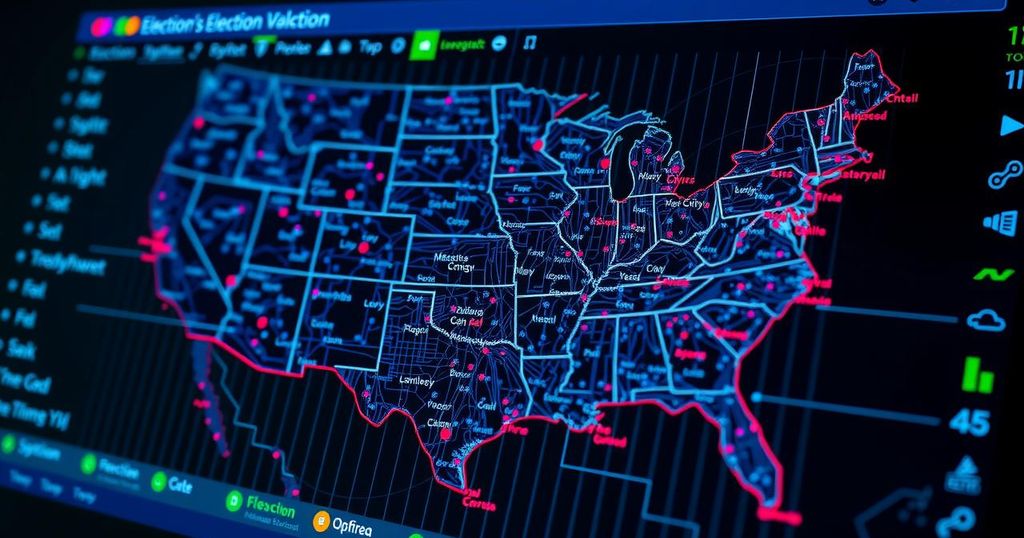A report by Microsoft reveals that Iranian hackers have targeted U.S. election-related websites to identify vulnerabilities ahead of the 2024 presidential election. Probing activities were discovered in April and involved reconnaissance of major media outlets in May. U.S. officials express concern over potential foreign influence and misinformation campaigns that may affect public perceptions about the election process.
According to a report by Microsoft, Iranian government-linked hackers have actively explored vulnerabilities in election-related websites across multiple U.S. swing states, potentially seeking to disrupt the upcoming presidential election. The probing activities, which took place in April and were only recently identified by Microsoft analysts, have raised alarms among officials from various federal agencies who are monitoring these developments closely. In addition to focusing on election sites, the hackers reportedly conducted reconnaissance on significant U.S. media platforms in May. U.S. intelligence agencies have assessed that Iran aims to sow discord during the 2024 election cycle, particularly targeting the campaign of former President Donald Trump while also fostering protests against U.S. policies toward Israel. As the election draws near, Microsoft analysts anticipate an increase in activity from this Iranian hacking group, referred to as “Cotton Sandstorm,” aligned with the historical tactics of election interference that this group has displayed. The reconnaissance efforts revealed no immediate threats to the integrity of the voting process, given the multiple safeguards in place. Nonetheless, U.S. officials express concern that the Iranian activity could contribute to public anxiety regarding voting by potentially leaking accessible voter registration data. This situation reflects ongoing foreign interventions targeting the U.S. electoral framework, characterized by parallel efforts from Russian and Chinese groups to either manipulate or surveil the election landscape. Compounding these concerns, U.S. intelligence highlighted that Russian operatives recently disseminated harmful content aimed at undermining Vice Presidential candidate Tim Walz, with additional worries that both Russia and Iran might leverage disinformation to incite violence in the lead-up to and following Election Day. A notable Russian subgroup transitioned from Telegram to X, deploying altered videos to attack figures associated with the Democratic party, thereby increasing the complexity of the electoral environment. Furthermore, the same Iranian group has a history of attempting to intimidate voters, as demonstrated in the 2020 election, and recently hacked documents from Trump’s campaign to leak sensitive information. Although China has not executed a concerted operation to influence the presidential election, intelligence assessments indicate that it has engaged in covert social media campaigns against various congressional and local election races. Chris Krebs, former head of the Cybersecurity and Infrastructure Security Agency, emphasized the expected increase in Iranian activity, noting, “I agree with the assessment that we should expect to see more out of Iran, even if it’s hapless and ineffective like their 2020 efforts.” Krebs also remarked on the persistent nature of disinformation operations as being more of an irritant than a decisive factor, stating, “But they’re cheap, they’re scalable, and there’s not a lot in terms of consequences.” He urged American voters to remain vigilant and not succumb to the ensuing chaos in the information landscape surrounding the election.
The expanding concern of foreign interference in U.S. elections has led to increased scrutiny from both government officials and private sector entities. The Iranian government’s utilization of hacking coupled with disinformation campaigns has been a persistent threat, as seen during previous electoral cycles. The continuous efforts by various nations, including Iran, Russia, and China, to influence public opinion and electoral outcomes highlight the evolving landscape of cybersecurity and the need for robust defenses in safeguarding democratic processes.
In summary, the recent discoveries reported by Microsoft about Iranian hackers probing U.S. election websites underscore the ongoing threat to the integrity of the electoral process. While current efforts have not escalated into more severe cyberattacks, the potential for increased activity during the election season poses a challenge. Ensuring voter awareness and vigilance amidst a likely increase in disinformation is crucial for maintaining public confidence in the electoral system.
Original Source: www.cnn.com






